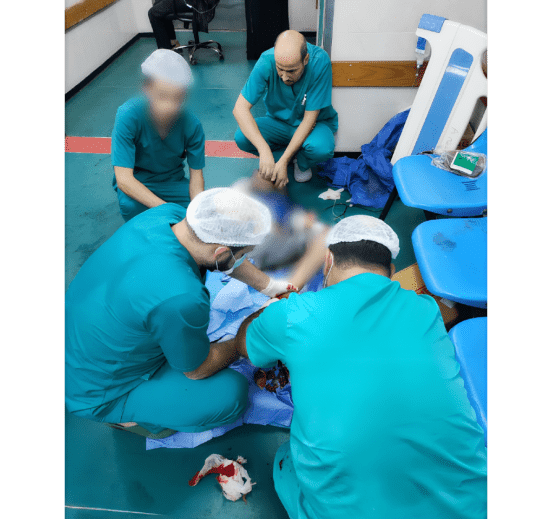SUHAIL HABIB, MSF VEHICLE MAINTENANCE SUPERVISOR
"We are trying to survive hunger."
“Life has not only become difficult, but it has become five times harder. We can’t find flour because the Israeli army blocked it. We are forced to eat animal food just to survive. Sometimes we eat bird food, donkey food, and sometimes grass which we pick from the corners of the streets. We are trying to survive hunger.
I go three days without food, and my wife keeps asking me: ‘What did you eat today?’ I reply that I’m not hungry. I come home empty-handed, with no food, barely any flour, no bread, no rice. Today, 1kg of rice costs $33 so I can’t afford to feed the children ...
February
ANONYMOUS MSF STAFF MEMBER
“We don’t know if we will survive the next hour”
"Today is Monday, the 12th of February, 2024. I was awakened at midnight because of bombing and couldn't fall asleep again. Around 5:00 a.m., there was a very strong airstrike, and in the beginning I thought it was my home. Then within seconds, I remembered my kids and I heard things falling apart in the room, so I covered my youngest daughter who was sleeping on my arm with sheets and went running to my other kids ... There were a lot of things hitting my back—stones, wood, a lot of other things that I couldn't understand in those few seconds...
LISA MACHEINER, MSF PROJECT COORDINATOR
"People are exhausted"
"There were attacks in Rafah yesterday [February 11] and also during the night. From Khan Younis, we could hear a lot of heavy explosions. Our windows and doors were shaking throughout the whole night. It was very, very noisy.
People don't feel safe. Children are terrified. They are distressed and it's been going on for months now and people are exhausted. There are hundreds of thousands of people everywhere. There is no space anymore. There is no space to move in a car. There is sometimes even no space to walk ...
“Mom, can we leave Gaza now? I really just want to live.”
Dr. Ruba*, an MSF doctor, shares an update on her situation and the heartbreaking conversations she has with her children about the very real possibility of death.
MARIE-AURE PERREAUT REVIAL, EMERGENCY COORDINATOR
"Babies who never learned to walk, and never will"
"One day we were alerted that an MSF staff member and his family had arrived at the emergency department, badly injured. Colleagues rushed to find them in the chaos.
Later, Dr. Samir* told me, 'I had to make a choice—I saw Ghassan* and his son, they needed me, but next to them I saw a woman critically injured, who also needed me. What was I supposed to do?'
Health care workers are forced into decisions like this every day in Gaza ...
January
AURÉLIE GODARD, HEAD OF MEDICAL ACTIVITIES IN GAZA
"They work in terrible conditions"
"In the emergency room, we saw a seriously injured patient who had arrived the day before. He’d had a tracheotomy, a chest tube inserted, and also abdominal surgery. He was surrounded by dozens of other patients in a room without electricity as generator fuel is scarce, and therefore his vital functions weren’t being monitored because the monitoring devices were not working. The team told us that they had recently lost a patient because they were unable to give him a blood transfusion. Their blood bank was empty. They work in terrible conditions."
"They use it once, then squeeze out the blood"
"They said that they didn’t have any [abdominal gauze] to spare, and that the ones they had were already being used on several patients," said Rami, an MSF nurse who was trapped in Nasser Hospital. "They use it once, then squeeze out the blood, wash it, sterilize it, and reuse it with another patient. This is the situation in Nasser’s operating theater—can you imagine?"
DR. ALDO RODRIGUEZ, MSF SURGEON
"Attacks on hospitals are a fact of life"
"My first hours in Gaza were marked by the constant buzz of the drones Israel uses to surveil the enclave. The stressful, loud sound can be heard non-stop, all day and even at night. I also saw landslides, collapsed buildings. Even though I knew about the dire conditions in Gaza ahead of time, it was still shocking to see everything in ruins and people looking for food under the rubble and waiting in endless lines to get some bread. There isn't a place in Gaza that doesn't have a shattered building."
"It's getting very, very complicated."
"They were asking if it was safe," said Carolina Lopez, MSF emergency coordinator. "And I cannot say to my staff, 'this place is safe.' I mean, there is no safe place in Gaza ... We cannot ensure the safety of our own staff. We cannot move, we cannot arrive at, we cannot work in the hospitals that are around because they are not secure either."
PASCALE COISSARD ROGERET, EMERGENCY COORDINATOR
"She gave birth to him in the latrines closest to her tent"
"This week, I sat down with some of our patients at Al-Emirati Hospital in Rafah, where people receive postpartum care. In addition to the exhaustion of childbirth, they must contend with the constant stress of bombings, displacement, poor living conditions in Rafah, and the uncertainty of what tomorrow holds. Three of these women’s stories particularly struck me."
December
JACOB BURNS, PROJECT COORDINATOR
"Staff are literally kneeling in blood on the floor"
"As I type this in the pre-dawn dark of Al-Mawasi—the coastal strip that Israel has designated as the humanitarian zone—I can hear bombs every minute hitting Khan Younis, two miles away in the south of Gaza. The house where I’m staying intermittently shakes with overwhelming force.
Earlier this week, a team of my colleagues were in Nasser Hospital, where we provide emergency care and surgical treatment, including to patients with traumatic injuries and severe burn injuries. We had been assured by the Israelis that the hospital would not be targeted. Yet, while we were there, leaflets suddenly fell from the sky ordering the immediate evacuation of premises near the hospital, including the road we use to get in and out of the facility."
"Staying alive is only a matter of luck"
"It was heartbreaking—running away and having to look at Palestinian colleagues and neighbors who had been with us all the time, helping us with everything, and knowing that most probably I would never see them again," said Ricardo Martinez, MSF logistics coordinator.
DR. RUBA, MSF DOCTOR
“After 60 days of war, I'm losing hope”
"We are displaced south from the valley, which is supposed to be a safe area, but every night, every day, there are airstrikes. They are targeting everybody. Nobody is safe.
There are a lot of different types of injuries. We saw burns from different kinds of sources. We saw raw areas. We saw fractures. Also, there are a lot of kids with amputations. We have only the primary medical supplies with paracetamol, ibuprofen, and dressings, and unfortunately, we don't have access to our clinic. The Israeli army cut the road ...
November
ANONYMOUS MSF STAFF
"They started opening fire at us"
“When we arrived at Al Wahida Street, I saw tanks and snipers at the top of the buildings. I was terrified when I saw that the snipers and the tanks were pointing their weapons at us, especially at the fourth and the fifth van [in the convoy]. They started opening fire at us and when a bullet grazed my forehead, I got a superficial injury.
The bullet hit my colleague Alaa in the head, he sat next to me. He got a critical head injury and started bleeding massively. His head fell on the steering [wheel] and I immediately retook control of the [vehicle] to move to the right of the street.”
"We try as much as possible to give them support"
“As a psychologist, the most common things I see among children are nightmares, bed-wetting, anxiety, fear. We try as much as possible to give them support via recreational activities. After that, we will work with the mothers through psychosocial education to explain what might happen to them because of the situation and how can they deal with it." — Marwa Abu Al Nour, MSF psychologist at Martyrs Clinic


